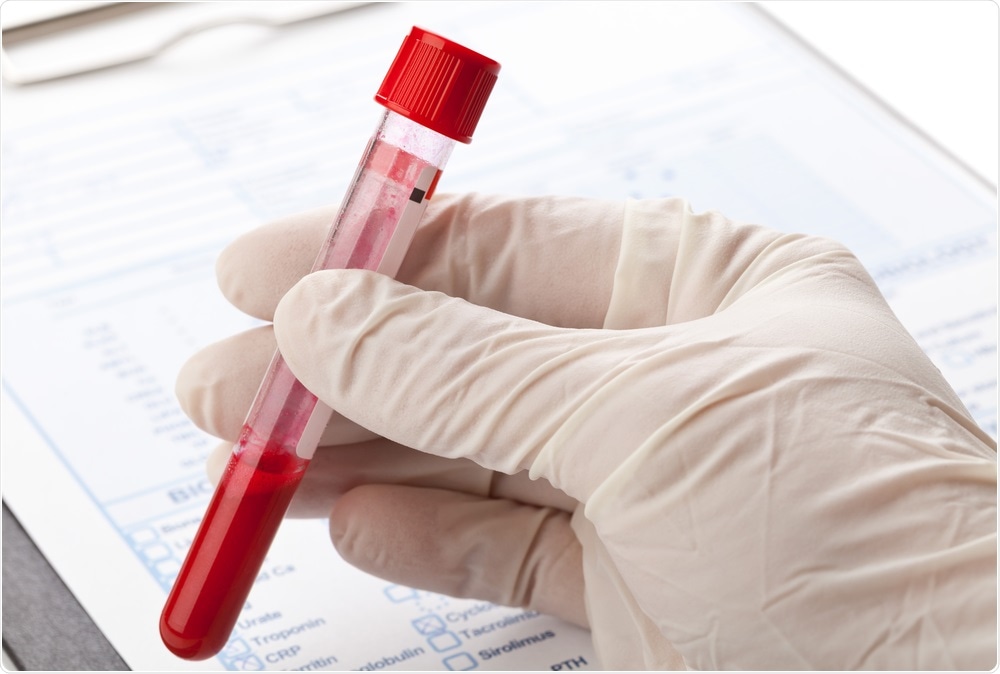Early diagnosis and treatment are essential to combat prostate cancer. Knowing how well a person will respond to therapeutics is also crucial for clinicians to decide on the proper treatment action.
Now, a simple blood test can help predict how men with prostate cancer will respond to treatment, according to a new study.
A team of researchers at The Institute of Cancer Research (ICR) in London found that the test can detect traces of cancer DNA in the bloodstream. The liquid biopsy could also identify the patients who are more likely to relapse.

Image Credit: Shawn Hempel / Shutterstock
The blood test
The new blood test, known as liquid biopsy, is less painful and cheaper than conventional tissue biopsies. It aims to determine which men are less likely to respond at the start of the treatment, or those who are at a high risk of relapse.
The test could provide more accurate patient care, helping doctors to tailor treatment for men with advanced prostate cancer. Further, it can help stop drugs that will not work as early as possible.
Detect traces of cancer in the blood
The researchers looked at more than 1,000 blood samples from 216 men with advanced prostate cancer, who were part of a clinical trial involving the drug abiraterone, with or without an experimental drug, ipatasertib.
The team has found that the tests can detect traces of cancer in the bloodstream and could monitor how the disease behaves and responds to treatment.
The study findings revealed that men with high levels of tumor DNA at the start of treatment had worse health outcomes. In fact, their illness progressed two and a half months earlier than those who tested negative for “ctDNA” at the beginning of the treatment.
The team also monitored patients with repeat blood tests during treatment. This way, they can see whether liquid biopsies could help predict response to treatment. They revealed that men who responded to treatment had the most significant drop of 23 percent in the level of cancer DNA in their blood. On the other hand, those who partially responded to treatment had a 16-percent drop.
In addition, after an analysis of DNA from the blood tests, the team found that there were specific genetic changes tied to drug resistance, indicating the risk of early relapse.
“Our study shows that a simple blood test could help us track how cancer evolves and responds to treatment – initially as part of clinical trials and eventually in routine care. These so-called liquid biopsy tests are minimally invasive, cost-effective, and can be performed often and with ease. Tracking prostate cancer with a blood test instead of a painful surgical biopsy could significantly improve patients’ quality of life,” Professor Johann de Bono, Professor of Experimental Cancer Medicine at The Institute of Cancer Research, London, said.
“Our study offers further evidence for the huge potential of liquid biopsies to help guide treatment, design personalized treatment plans, and improve patient outcomes,” he added.
The team believes that liquid biopsies will have positive impacts on how clinicians can tract the way cancers evolve and respond to treatment. It can help doctors come up with individualized treatment plans.
“This study showcases the value of liquid biopsies for guiding therapy. They are a faster, kinder, more flexible alternative to traditional tissue biopsies and are set to become a gold standard for cancer treatment,” Professor Paul Workman, Chief Executive of The Institute of Cancer Research, London, said.
What is prostate cancer?
Prostate cancer is the type of cancer that occurs in the prostate, which is a small, walnut-shaped gland in men. The gland is responsible for producing seminal fluid, which nourishes and transports sperm.
Prostate cancer is the second most common cancer in men. In 2012, about 1.1 million men were diagnosed across the globe.
The incidence of prostate cancer varies, with rates are the highest in Australia, New Zealand, North America, and western and northern Europe. The rates are high in these areas sue to the practice of prostate-specific antigen (PSA) testing.